-
 Bitcoin
Bitcoin $114400
1.32% -
 Ethereum
Ethereum $3499
2.20% -
 XRP
XRP $2.922
4.26% -
 Tether USDt
Tether USDt $0.0000
0.03% -
 BNB
BNB $752.6
1.53% -
 Solana
Solana $161.8
1.64% -
 USDC
USDC $0.9999
0.01% -
 TRON
TRON $0.3267
1.32% -
 Dogecoin
Dogecoin $0.1991
3.02% -
 Cardano
Cardano $0.7251
3.29% -
 Hyperliquid
Hyperliquid $38.32
3.36% -
 Stellar
Stellar $0.3972
7.58% -
 Sui
Sui $3.437
2.74% -
 Chainlink
Chainlink $16.29
3.65% -
 Bitcoin Cash
Bitcoin Cash $545.3
3.70% -
 Hedera
Hedera $0.2482
7.49% -
 Ethena USDe
Ethena USDe $1.001
0.03% -
 Avalanche
Avalanche $21.40
2.02% -
 Toncoin
Toncoin $3.579
1.56% -
 Litecoin
Litecoin $109.3
2.20% -
 UNUS SED LEO
UNUS SED LEO $8.951
-0.18% -
 Shiba Inu
Shiba Inu $0.00001220
2.75% -
 Polkadot
Polkadot $3.613
2.99% -
 Uniswap
Uniswap $9.173
3.78% -
 Monero
Monero $302.6
2.62% -
 Dai
Dai $0.0000
0.00% -
 Bitget Token
Bitget Token $4.320
1.52% -
 Pepe
Pepe $0.00001048
3.40% -
 Cronos
Cronos $0.1314
4.33% -
 Aave
Aave $259.4
3.54%
What is the custody mechanism of a Bitcoin ETF?
The choice of custodian for Bitcoin ETFs is paramount, influencing both security and regulatory compliance, thus impacting investor confidence and market stability.
Feb 16, 2025 at 08:01 am
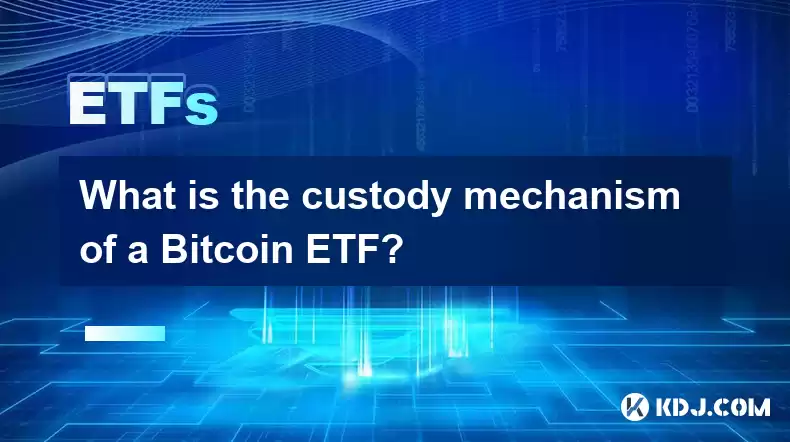
Key Points:
- Understanding the role of custodians in Bitcoin ETFs
- Types of custodians and their functions
- Custody process and security measures
- Regulatory framework for ETF custody
- Implications for investors and market stability
Understanding the Role of Custodians in Bitcoin ETFs
Exchange-traded funds (ETFs) provide investors with a convenient way to gain exposure to cryptocurrencies without directly holding or managing the underlying assets. Bitcoin ETFs, in particular, offer a regulated and accessible means of investing in the cryptocurrency market.
At the heart of Bitcoin ETFs lies the critical role of custodians. These specialized financial institutions are responsible for the safekeeping, storage, and management of the Bitcoin underlying the ETF shares.
Types of Custodians and Their Functions
Custodians for Bitcoin ETFs fall into two main categories: qualified custodians and non-qualified custodians.
- Qualified custodians: These institutions meet the stringent requirements set by the U.S. Securities and Exchange Commission (SEC) and other regulatory bodies. They provide a high level of security and are subject to regular audits and inspections.
- Non-qualified custodians: These institutions may not meet all the requirements for qualified custodians but are still subject to regulatory oversight. They typically provide a lower level of security and are often used for ETFs that hold smaller amounts of Bitcoin.
The primary functions of custodians include:
- Safeguarding the physical or private keys of the Bitcoin
- Managing the movement and storage of Bitcoin
- Ensuring the integrity of the Bitcoin holdings
- Providing transparency and reporting on custody activities
Custody Process and Security Measures
The custody process for Bitcoin ETFs typically involves the following steps:
- Deposit: The Bitcoin is deposited into a dedicated wallet or vault controlled by the custodian.
- Verification: The custodian verifies the ownership and amount of Bitcoin deposited.
- Storage: The Bitcoin is stored in secure hardware wallets, vaults, or other storage solutions designed to protect against unauthorized access.
- Monitoring: The custodian regularly monitors the security and integrity of the Bitcoin holdings.
- Redemption: When an investor redeems their ETF shares, the custodian releases the corresponding amount of Bitcoin to the investor's designated wallet.
Security measures employed by custodians include:
- Cold storage: Bitcoin is stored offline in secure hardware wallets or vaults, reducing the risk of hacking and theft.
- Multi-factor authentication (MFA): Access to custody systems requires multiple layers of authentication, including biometrics and hardware tokens.
- Insurance: Custodians typically provide insurance coverage for the Bitcoin held in custody.
Regulatory Framework for ETF Custody
The regulatory framework for Bitcoin ETF custody varies across jurisdictions. In the United States, the SEC requires custodians to meet specific criteria, including:
- Audited financial statements
- Physical possession and control of the Bitcoin
- Independent board of directors
- Robust cybersecurity measures
Custodians must also comply with anti-money laundering (AML) and know-your-customer (KYC) regulations to prevent illicit use of the ETF.
Implications for Investors and Market Stability
The choice of custodian has significant implications for investors and the overall market stability. Investors should consider the following factors:
- Security: The custodian's reputation and track record in maintaining the security of assets.
- Regulatory compliance: The custodian's compliance with relevant regulations and industry standards.
- Insurance coverage: The extent of insurance coverage provided by the custodian.
- Fees: The fees charged by the custodian for custody services.
A secure and well-regulated custody mechanism is essential for the growth and stability of the Bitcoin ETF market. Investors can have confidence in their investments knowing that their Bitcoin is held in a secure and compliant manner.
FAQs:
1. What are the key security risks associated with Bitcoin ETF custody?
- Hacking attacks targeting custody systems
- Internal fraud or collusion within the custodian
- Physical theft or destruction of stored Bitcoin
2. How do custodians mitigate the risk of unauthorized access to Bitcoin?
- Cold storage
- Multi-factor authentication
- Physical security measures
- Employee screening and background checks
3. What role do regulatory bodies play in ensuring the security of Bitcoin ETFs?
- Enforcing custody requirements
- Conducting regular audits and inspections
- Reviewing and approving custodian appointments
- Setting standards for anti-money laundering and know-your-customer (KYC) compliance
Disclaimer:info@kdj.com
The information provided is not trading advice. kdj.com does not assume any responsibility for any investments made based on the information provided in this article. Cryptocurrencies are highly volatile and it is highly recommended that you invest with caution after thorough research!
If you believe that the content used on this website infringes your copyright, please contact us immediately (info@kdj.com) and we will delete it promptly.
- BCUT: Support Holds, Accumulation Hints at Potential Reversal
- 2025-08-04 10:50:12
- Bitcoin's Bullish Expansion: Decoding Bollinger Bands and Whale Bets
- 2025-08-04 10:55:12
- XRP, Solana, and Whales: Decoding the Crypto Tides
- 2025-08-04 11:10:11
- BlockDAG's Grand Finale: Auction Fever and the Dawn of a New Era
- 2025-08-04 10:30:12
- Kaia Files: Will South Korea Embrace a KRW-Pegged Stablecoin?
- 2025-08-04 10:30:12
- Kaspa, HBAR, and Cold Wallet: A New York Minute on Crypto's Latest Moves
- 2025-08-04 09:11:54
Related knowledge
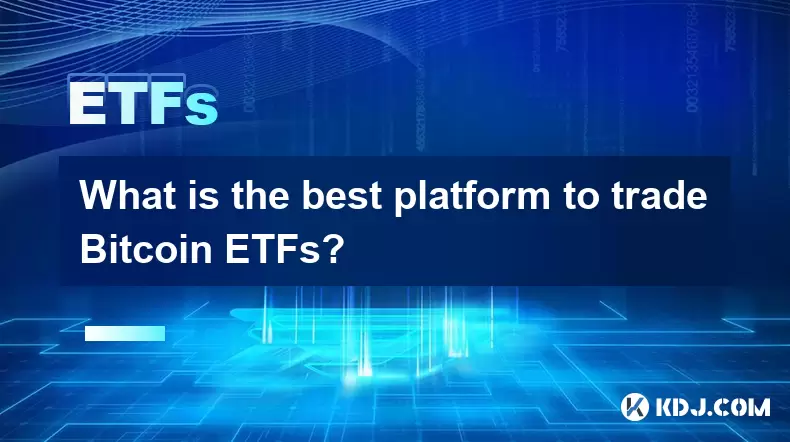
What is the best platform to trade Bitcoin ETFs?
Jul 23,2025 at 04:14am
Understanding Bitcoin ETFs and Their Role in TradingBitcoin Exchange-Traded Funds (ETFs) have gained significant traction among traditional and crypto...
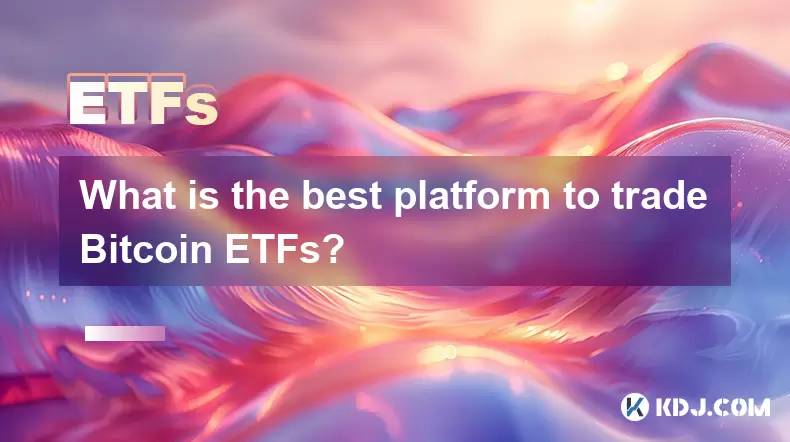
What is the best platform to trade Bitcoin ETFs?
Jul 17,2025 at 03:50pm
Understanding Bitcoin ETFs and Their Role in the MarketBitcoin Exchange-Traded Funds (ETFs) are investment vehicles that track the price of Bitcoin wi...
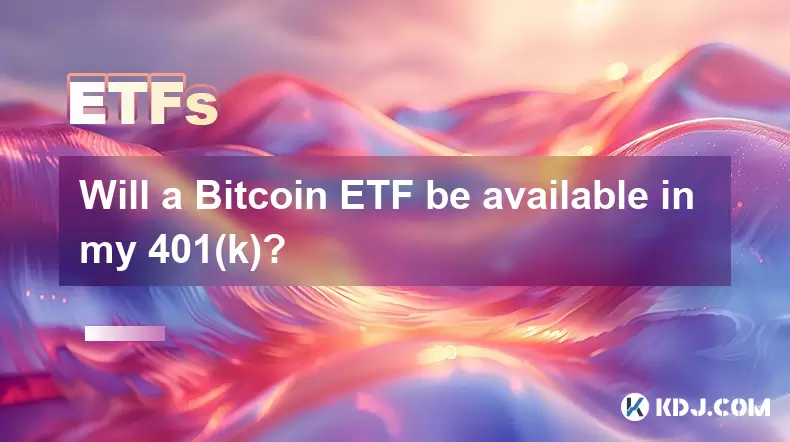
Will a Bitcoin ETF be available in my 401(k)?
Jul 17,2025 at 10:42pm
What is a Bitcoin ETF?A Bitcoin ETF (Exchange-Traded Fund) is an investment vehicle that tracks the price of Bitcoin without requiring investors to di...
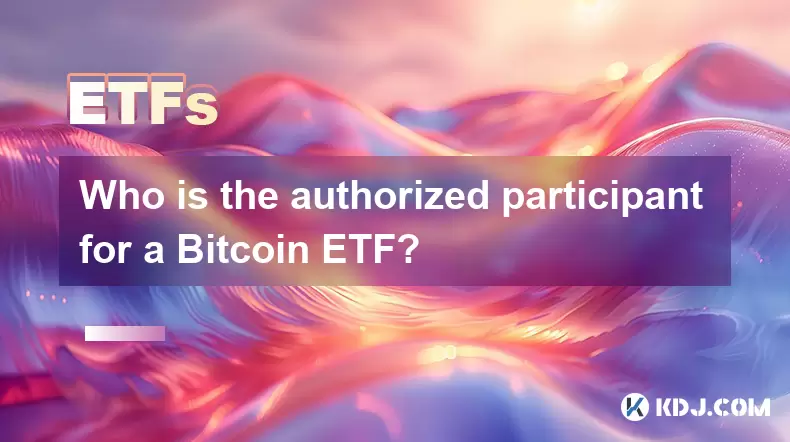
Who is the authorized participant for a Bitcoin ETF?
Jul 18,2025 at 12:42am
Understanding the Role of Authorized Participants in Bitcoin ETFsIn the context of Bitcoin Exchange-Traded Funds (ETFs), an authorized participant (AP...
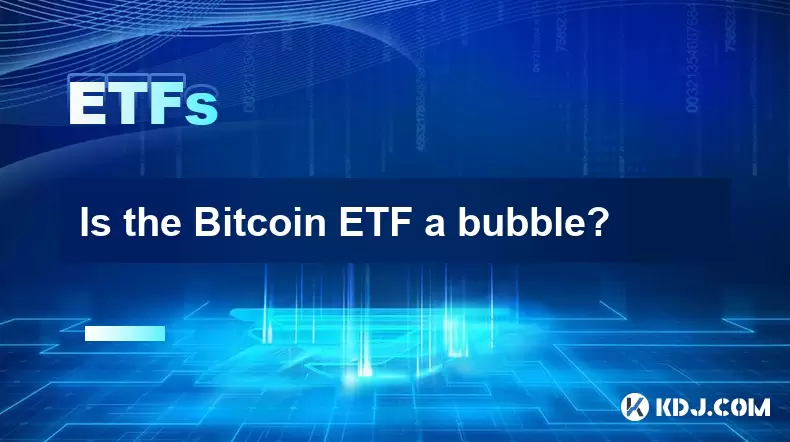
Is the Bitcoin ETF a bubble?
Jul 20,2025 at 06:57am
Understanding the Bitcoin ETF ConceptA Bitcoin Exchange-Traded Fund (ETF) is a financial product that aims to track the price of Bitcoin without requi...
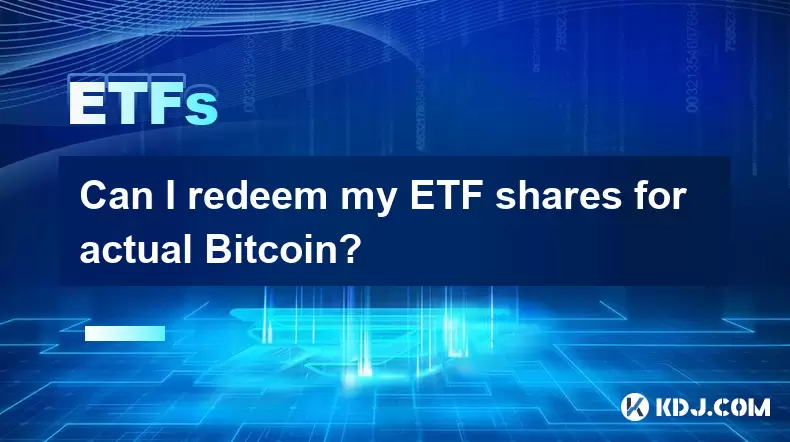
Can I redeem my ETF shares for actual Bitcoin?
Jul 17,2025 at 03:14pm
Understanding ETF Shares and Their Relation to BitcoinExchange-Traded Funds (ETFs) have become a popular investment vehicle for those looking to gain ...

What is the best platform to trade Bitcoin ETFs?
Jul 23,2025 at 04:14am
Understanding Bitcoin ETFs and Their Role in TradingBitcoin Exchange-Traded Funds (ETFs) have gained significant traction among traditional and crypto...

What is the best platform to trade Bitcoin ETFs?
Jul 17,2025 at 03:50pm
Understanding Bitcoin ETFs and Their Role in the MarketBitcoin Exchange-Traded Funds (ETFs) are investment vehicles that track the price of Bitcoin wi...

Will a Bitcoin ETF be available in my 401(k)?
Jul 17,2025 at 10:42pm
What is a Bitcoin ETF?A Bitcoin ETF (Exchange-Traded Fund) is an investment vehicle that tracks the price of Bitcoin without requiring investors to di...

Who is the authorized participant for a Bitcoin ETF?
Jul 18,2025 at 12:42am
Understanding the Role of Authorized Participants in Bitcoin ETFsIn the context of Bitcoin Exchange-Traded Funds (ETFs), an authorized participant (AP...

Is the Bitcoin ETF a bubble?
Jul 20,2025 at 06:57am
Understanding the Bitcoin ETF ConceptA Bitcoin Exchange-Traded Fund (ETF) is a financial product that aims to track the price of Bitcoin without requi...

Can I redeem my ETF shares for actual Bitcoin?
Jul 17,2025 at 03:14pm
Understanding ETF Shares and Their Relation to BitcoinExchange-Traded Funds (ETFs) have become a popular investment vehicle for those looking to gain ...
See all articles

























































































